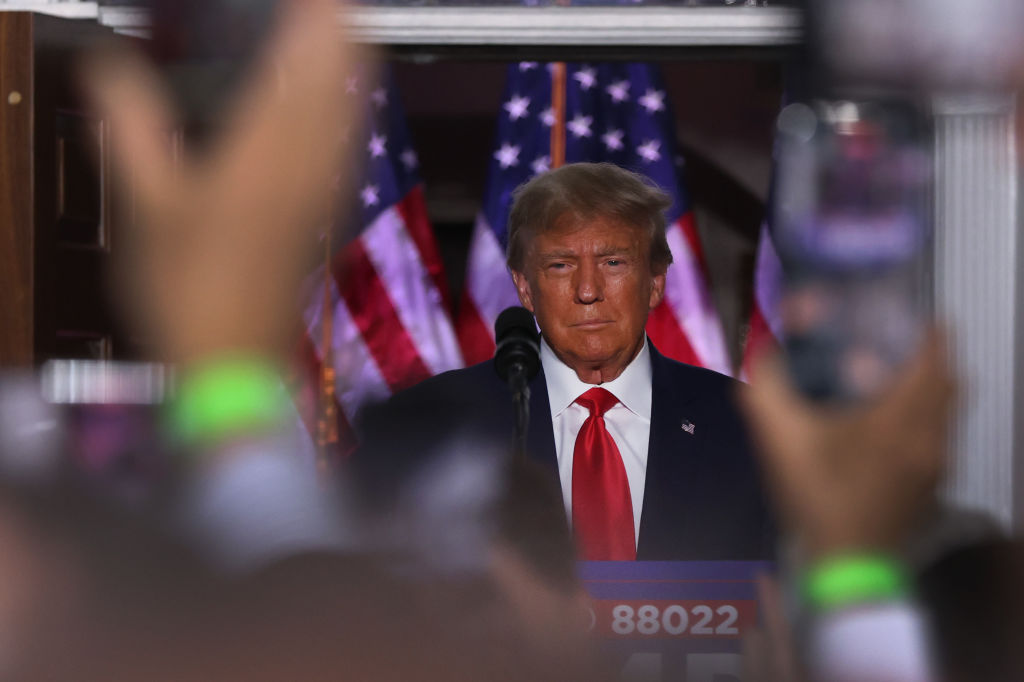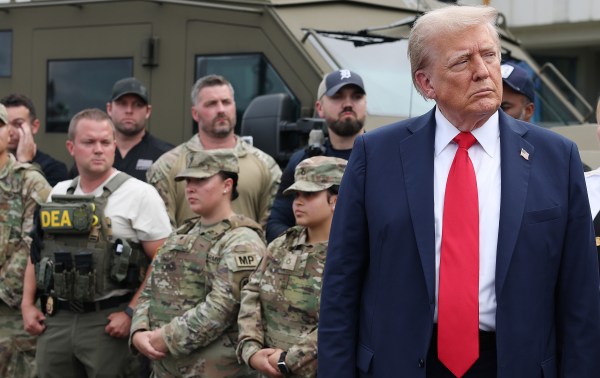Welcome to an early edition of The Collision—the one we thought we might write last week when it looked as if the federal grand jury was ready to indict former President Donald Trump on charges related to his response to the 2020 election.
That indictment was finally unsealed Tuesday afternoon, followed by a brief public statement from special counsel Jack Smith in which he encouraged the public to “read it in full.” Don’t worry, we were already several pages in by that point.
A Difficult Case to Prove
A year ago, it seemed as if Attorney General Merrick Garland had all but shut the door on bringing charges related to January 6 against former President Donald Trump. But, once again, Trump forced his hand.
After Trump forced the FBI to get a search warrant to retrieve classified documents at his Mar-a-Lago home, Garland was going to have to investigate whether criminal charges should be pursued. And once he felt that department regulations required the appointment of a special counsel, he was going to have to include January 6 in its purview. And once Jack Smith—a prosecutor known for bringing aggressive cases against his targets—was picked as the special counsel, this day was all but assured.
This is now the biggest case that the Department of Justice has ever brought—felony charges against a former president for trying to overthrow an American election. But big cases require big evidence, and that’s where Smith has problems.
First, all of these charges require prosecutors to prove Trump knew he had lost the 2020 election. They will prove that every election fraud claim he made was false. They will show that everyone from his attorney general to his White House lawyers to state elected officials told him that his claims were false. They will remind jurors of just how catastrophic the results of his lies were on January 6. And none of that will be enough. This will be a trial about Donald Trump’s state of mind. If Trump can convince one juror that he believed that he won the 2020 election and that he was trying to prevent the election from being stolen with fraudulent votes, then that’s the ballgame.
Second, the indictment focuses on four areas—pressuring state election officials to change the results; organizing fake slates of electors; using the Department of Justice to pressure state officials to change their electoral votes; and attempting to get Vice President Mike Pence to refuse to certify the results. All of the facts in these allegations are outrageous when you understand that Trump had no evidence of fraud that could have changed the election despite dozens of chances to litigate his claims in courts across the country.
But this is a much less clear-cut case than the one down in Florida about the documents and obstruction. These charges are broad and vague at times. A lot of what is included in the indictment is irrelevant. There’s constitutionally protected speech. There’s political pressure. To put it another way: dereliction of duty, sowing chaos in the aftermath of an American election, falsely attacking local officials to the point that their families receive death threats may be (should be!) impeachable conduct, but it’s not necessarily criminal.
Third, this case is going to be much more challenging to win than the other federal indictment we’ve seen and affect the country in a different way. Without classified documents, there’s a good chance this case could move faster than the Florida case, but there’s no guarantee of that. Regardless, this will most likely be a trial relitigating the 2020 election in the midst of the 2024 election brought by a Justice Department that is run by one of the candidates against the other candidate. Remember: The special counsel isn’t independent from DOJ. Jack Smith reports to Attorney General Merrick Garland.
Republicans who believe that the 2020 election was not fair will not suddenly be convinced they are wrong. Democrats who believe that Donald Trump incited the riots on January 6 aren’t going to have a lot of interest in dispassionately thinking about whether the prosecution has met its burden of proof. A guilty verdict will undoubtedly be appealed on the grounds that these charges can’t be applied to this conduct. Assuming Trump loses in 2024, this case—including the appellate process—could stretch out for years. If Trump wins, it’s an even bigger mess.
Sarah’s View
Trump lied to the American people repeatedly about the results of the 2020 election. He pressured elected officials to do things that would have been good for him politically and bad for the country. He allowed a mob to overtake the Capitol while he lobbied senators for their votes, and he considered replacing his attorney general with an incompetent toady who would support his political whims. But none of that is criminal if Trump believed the election was riddled with fraud. A lot of it isn’t criminal even if he didn’t believe it. I wish this indictment had narrowed its focus, homing in only on the conduct that fell clearly on the criminal side of the line and not included the parts that simply inspire outrage (of which there is plenty).
I think the Florida case warranted charges and is a strong case. And I think the American people can understand the charges and accept the results—even in an election year. This thing, though, is a whole different kettle of fish. I don’t believe it was politically motivated or is the result of political corruption at the Department. Quite the opposite. I think it’s the result of career prosecutors not thinking about the politics at all.
David French ended his most recent column by saying “Smith has brought a difficult case. But it’s a necessary case … This is the trial America needs.” At a time when so many Americans are questioning the legitimacy of our institutions and believe that our laws can be wielded by their enemies for political advantage, I can only agree with the first sentence. A trial relying on vague laws to prosecute a presidential candidate who may well have believed the lies that assured him that he wasn’t a loser is the last thing this country needs.
In the end, though, it’ll be up to 12 Americans who have sworn to be fair and impartial. And that’s the most American thing of all.
The Court of Public Opinion Polls
The last time Trump was indicted by a federal grand jury—a mere two months ago—the former president made this astute observation: “I mean, the only good thing about it is, it’s driven my poll numbers way up. Can you believe this?”
It’s not quite correct that Trump’s numbers went “way” up after the June 8 indictment, but that’s only because his polling had already seen an enduring boost in the days following his March 30 indictment in New York on business fraud charges. That case, brought by Manhattan District Attorney Alvin Bragg, seemed to jump-start Trump’s flagging campaign: In the RealClear Politics average of national primary polls, Trump jumped 10 points between March 20 and April 20. Since the beginning of April, he’s not been below 50 percent. And, yes, Trump even saw a little boost in his polling in the days after his more legally serious June indictment over his mishandling of classified documents and obstruction of justice.
There’s reason to think Trump’s poll numbers in the Republican primary won’t go down again with this latest indictment. The latest poll from the New York Times and Siena College lays it bare: The vast majority of likely Republican primary voters say they don’t believe Trump has done anything wrong—not with his handling of classified documents and not with his actions regarding the 2020 election.
Consider this in light of the new indictment: While 53 percent of registered voters polled said that Trump “went so far” after the 2020 election that “he threatened American democracy,” just 19 percent of likely Republican primary voters said the same thing. Instead, 75 percent of those Republicans agreed more with the statement that Trump “was just exercising his right to contest the election.” Only 39 percent of all registered voters said they agreed with that.
Among all registered voters, according to the Times poll, 51 percent said they believe Trump has committed “serious federal crimes,” while 35 percent said they did not believe he had. But among those likely Republican primary voters? Just 17 percent said they believed Trump committed serious federal crimes and 71 percent said they did not.
Those lopsided numbers of how likely Republican primary voters view the substance of Trump’s two federal indictments tell much of the story of the state of the race for the GOP nomination. According to the Times poll, 54 percent say they support Trump, with just 17 percent expressing support for Florida Gov. Ron DeSantis. The rest are all in single digits.
How the Field Plays It
How are the other members of the Republican presidential field responding to their rival’s indictment? DeSantis, for one, is staying the course on his message that the Justice Department is engaging in prosecutorial overreach when it comes to Trump. Here’s his statement in full, as posted on Twitter Tuesday evening:
As President, I will end the weaponization of government, replace the FBI Director, and ensure a single standard of justice for all Americans.
While I’ve seen reports, I have not read the indictment. I do, though, believe we need to enact reforms so that Americans have the right to remove cases from Washington, DC to their home districts.
Washington, DC is a “swamp” and it is unfair to have to stand trial before a jury that is reflective of the swamp mentality.
One of the reasons our country is in decline is the politicization of the rule of law. No more excuses—I will end the weaponization of the federal government.
We’re told not to expect DeSantis, or much of the field, to stray far from the tut-tutting about “weaponization” of law enforcement when it comes to these federal indictments—though a source close to the DeSantis campaign told The Collision last week that could change if the Fulton County, Georgia, grand jury indicts Trump there.
For something a little different, we can turn to former Vice President Mike Pence, who himself is prominent in the new indictment as a target of Trump’s efforts to delay the counting of the electoral votes on January 6. On Tuesday evening, Pence joined a previously scheduled Zoom call organized by Principles First, an anti-Trump conservative activist organization, for a forum with group’s founder, Heath Mayo. Asked about the just-released indictment, Pence admitted he had not yet read it and would not “prejudge” it. But he did repeat a line he uses on the trail about Trump’s fitness for office.
“I think with today’s news, it’s more important than ever that while the president is entitled to a presumption of innocence and is entitled to his day in court, I truly do believe, as we decide our standard-bearer for our party going forward, it’s important that we do so in a way that recognizes that no one who puts themselves over the Constitution should ever be President of the United States,” Pence said. His campaign issued a written statement saying much of the same thing a few minutes later.
Pence sticks out, along with former Arkansas Gov. Asa Hutchinson and former Rep. Will Hurd, as the few Republican presidential candidates willing to criticize Trump, not the Justice Department, over the frontrunner’s legal problems. What else unites these three? None of them have yet qualified to appear on the debate stage in Milwaukee later this month.
In fact, only one explicit critic of Trump, former New Jersey Gov. Chris Christie, appears to have qualified for the debate.








Please note that we at The Dispatch hold ourselves, our work, and our commenters to a higher standard than other places on the internet. We welcome comments that foster genuine debate or discussion—including comments critical of us or our work—but responses that include ad hominem attacks on fellow Dispatch members or are intended to stoke fear and anger may be moderated.
With your membership, you only have the ability to comment on The Morning Dispatch articles. Consider upgrading to join the conversation everywhere.